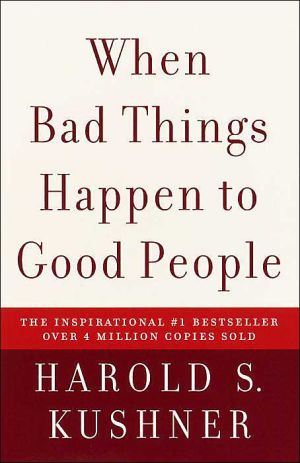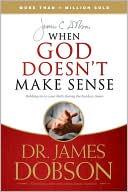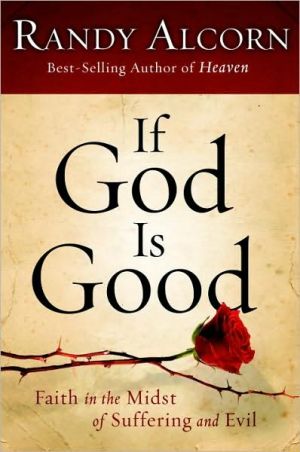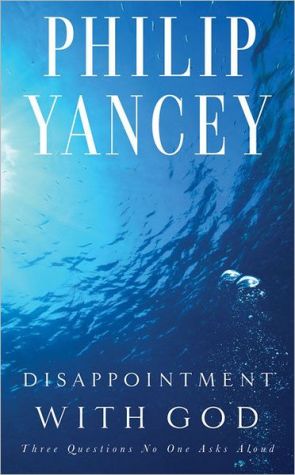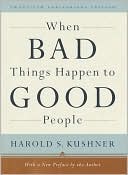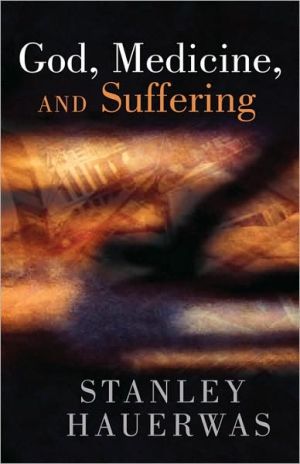The God I Don't Understand: Reflections on Tough Questions of Faith
If we are honest, we have to admit that there are many things we don't understand about God. We do not have final answers to the deep problems of life, and those who say they do are probably living in some degree of delusion. There are areas of mystery in our Christian faith that lie beyond the keenest scholarship or even the most profound spiritual exercises. For many people, these problems raise so many questions and uncertainties that faith itself becomes a struggle, and the very person...
Search in google:
If we are honest, we have to admit that there are many things we don't understand about God, especially in the face of terrible suffering and evil. Chris Wright offers reflections and encouragement from the Scriptures, so that those who are troubled by these tough questions can still sustain their faith.
\ The God I Don't Understand\ \ Reflections on Tough Questions of Faith \ \ \ \ By Christopher J. H. Wright \ Zondervan \ Copyright © 2008 \ \ Christopher J. H. Wright\ All right reserved.\ \ \ ISBN: 978-0-310-27546-6 \ \ \ \ \ Chapter One The Mystery of Evil \ It's all very well to say, "Turn to the Bible", but you can read the Bible from cover to cover, again and again, looking for a simple, clear answer to the question of the ultimate origin of evil, and you won't find an answer. I am not talking here about the entry of evil into human life and experience in Genesis 3, which we will think about in a moment, but about how the evil force that tempted human beings into sin and rebellion came to be there in the first place. That ultimate origin is not explained.\ This has not stopped many people from trying to come up with an answer for themselves and dragging in whatever bits of the Bible they think will support their theory. But it seems to me that when we read the Bible asking God, "Where did evil come from? How did it originally get started?" God seems to reply, "That is not something I intend to tell you." In other words, the Bible compels us to accept the mystery of evil. Notice I did not say, "compels us to accept evil". The Bible never does that or asks us to do so. We are emphatically told to reject and resist evil. Rather, I mean that the Bible leads us to accept that evil is a mystery (especially in terms of its origin), a mystery that we human beings cannot finally understand or explain. And we will see in a moment that there is a good reason why that is so.\ Moral Evil\ However, in one sense, there is no mystery at all about the origin (in the sense of the actual effective cause) of a great deal of suffering and evil in our world. A vast quantity-and I believe we could say the vast majority-of suffering is the result of human sin and wickedness. There is a moral dimension to the problem. Human beings suffer in broad terms and circumstances because human beings are sinful.\ It is helpful, I think, even if it is oversimplified, to make some distinction between what we might call "moral" evil and "natural" evil. This is not necessarily the best kind of language, and there are all kinds of overlaps and connections. But I think it does at least articulate a distinction that we recognize as a matter of common sense and observation.\ By "moral" evil is meant the suffering and pain that we find in the world standing in some relation to the wickedness of human beings, directly or indirectly. This is evil that is seen in things that are said and done, things that are perpetrated, caused, or exploited, by human action (or inaction) in the realm of human life and history. To this we need to link spiritual evil and explore what the Bible has to say about "the evil one"-the reality of satanic, spiritual evil forces that invade, exploit, and amplify human wickedness.\ By "natural" evil is meant suffering that appears to be part of life on earth for all of nature, including animal suffering caused by predation and the suffering caused to human beings by events in the natural world that seem (in general anyway) to be unrelated to any human moral cause-things like earthquakes, volcanoes, tsunamis, tornadoes and hurricanes, floods, etc., that is, so-called natural disasters.\ In the case of moral evil, sometimes there is a direct link between sin and suffering. For example, some people directly cause other people to suffer through violence, abuse, cruelty, or just sheer callousness and neglect. Or sometimes people suffer directly the effects of their own wrong actions. Someone who drives too fast or drinks too much and ends up killing themselves in a road accident suffers the direct impact of their own sin or folly. Or we may suffer the punishment of the laws of our society for wrongdoing. Being put in prison is a form of suffering and in that respect it is an evil thing. And yet we recognize that some form of punishment for wrongdoing is a necessary evil. More than that, we have a strong instinct that when people are not punished when they are guilty of wrongdoing, that is another and even greater evil. Punishment, when deserved as a part of a consensual process of justice, is a good thing too.\ But there is also a vast amount of suffering caused indirectly by human wickedness. The drunken driver may survive, but kill or injure other innocent people. Wars cause so-called collateral damage. Stray bullets from a gang fight or bank robbery kill innocent bystanders. A railway maintenance crew goes home early and fails to complete inspection of the track; a train is derailed and people are killed and injured. Whole populations suffer for generations after negligent industrial contamination. We can multiply examples from almost every news bulletin we see or hear. These are all forms of moral evil. They cause untold suffering, and they all go back in some form or another to culpable actions or failures of human beings.\ Somehow, we manage to live with such facts, simply because they are so common and universal that we have "normalized" them, even if we regret or resent them and even if we grudgingly admit that humanity itself is largely to blame. But whenever something terrible on a huge scale happens, like the 2004 tsunami, or the cylone in Myanmar in 2008, or the earthquakes in Pakistan, Peru, and China, the cry goes up, "How can God allow such a thing? How can God allow such suffering?" My own heart echoes that cry and I join in the protest at the gates of heaven. Such appalling suffering, on such a scale, in such a short time, inflicted on people without warning and for no reason, offends all our emotions and assumptions that God is supposed to care. We who believe in God, who know and love and trust God, find ourselves torn apart by the emotional and spiritual assault of such events.\ "How can God allow such things?" we cry, with the built-in accusation that if he were any kind of good and loving God, he would not allow them. Our gut reaction is to accuse God of callousness or carelessness and to demand that he do something to stop such things.\ But when I hear people voicing such accusations-especially those who don't believe in God but like to accuse the God they don't believe in of his failure to do things he ought to do if he did exist-then I think I hear a voice from heaven saying:\ "Well, excuse me, but if we're talking here about who allows what, let me point out that thousands of children are dying every minute in your world of preventable diseases that you have the means (but obviously not the will) to stop. How can you allow that?\ "There are millions in your world who are slowly dying of starvation while some of you are killing yourselves with gluttony. How can you allow such suffering to go on?\ "You seem comfortable enough knowing that millions of you have less per day to live on than others spend on a cup of coffee, while a few of you have more individual wealth than whole countries. How can you allow such obscene evil and call it an economic system?\ "There are more people in slavery now than in the worst days of the pre-abolition slave trade. How can you allow that?\ "There are millions upon millions of people living as refugees, on the knife-edge of human existence, because of interminable wars that you indulge in out of selfishness, greed, ambition, and lying hypocrisy. And you not only allow this, but collude in it, fuel it, and profit from it (including many of you who claim most loudly that you believe in me).\ "Didn't one of your own singers put it like this, 'Before you accuse me, take a look at yourself.'"\ So it seems to me that there is no doubt at all, even if one could not put a percentage point on the matter, that the vast bulk of all the suffering and pain in our world is the result, direct or indirect, of human wickedness. Even where it is not caused directly by human sin, suffering can be greatly increased by it. What Hurricane Katrina did to New Orleans was bad enough, but how much additional suffering was caused by everything from looters to bureaucratic incompetence? HIV-AIDS is bad enough, but how many millions suffer preventable illness and premature death because corporate and political greed and callousness put medicines that are affordable and available in the West totally out of their reach? What the cyclone did to Myanmar was horrendous, but its effects were multiplied by the characteristically brutal refusal of the government to allow international aid organizations into the country until weeks later. Human callousness undoubtedly precipitated the death of thousands and prolonged the misery of the survivors.\ The Bible's Diagnosis\ In a sense, then, there is no mystery. We suffer because we sin. This is not to say, I immediately hasten to add, that every person suffers directly or proportionately because of their own sin (the Bible denies that). It is simply to say that the suffering of the human race as a whole is to a large extent attributable to the sin of the human race as a whole.\ The Bible makes this clear up front. Genesis 3 describes in a profoundly simple story the entry of sin into human life and experience. It came about because of our wilful rejection of God's authority, distrust of God's goodness, and disobedience of God's commands. And the effect was brokenness in every relationship that God had created with such powerful goodness.\ The world portrayed in Genesis 1 and 2 is like a huge triangle of God, the earth, and humanity.\ Every relationship portrayed was spoiled by the invasion of sin and evil: the relationship between us and God, the relationship between us and the earth, and the relationship between the earth and God.\ Genesis 3 itself shows the escalation of sin. Even in this simple story, we can see sin moving from the heart (with its desire), to the head (with its rationalization), to the hand (with its forbidden action), to relationship (with the shared complicity of Adam and Eve). Then, from Genesis 4-11, the portrayal moves from the marriage relationship to envy and violence between brothers, to brutal vengeance within families, to corruption and violence in wider society and the permeation of the whole of human culture, infecting generation after generation with ever-increasing virulence.\ The Bible's diagnosis is radical and comprehensive.\ Sin has invaded every human person (everyone is a sinner).\ Sin distorts every dimension of the human personality (spiritual, physical, mental, emotional, social).\ Sin pervades the structures and conventions of human societies and cultures.\ Sin escalates from generation to generation within human history.\ Sin affects even creation itself.\ We read a chapter like Job 24, and we know it speaks the truth about the appalling morass of human exploitation, poverty, oppression, brutality and cruelty. And, like Job, we wonder why God seems to do nothing, to hold nobody to account, and to bring nobody to instant justice.\ Why does the Almighty not set times for judgment? Why must those who know him look in vain for such days? There are those who move boundary stones; they pasture flocks they have stolen. They drive away the orphan's donkey and take the widow's ox in pledge. They thrust the needy from the path and force all the poor of the land into hiding. Like wild donkeys in the desert, the poor go about their labor of foraging food; the wasteland provides food for their children. They gather fodder in the fields and glean in the vineyards of the wicked. Lacking clothes, they spend the night naked; they have nothing to cover themselves in the cold. They are drenched by mountain rains and hug the rocks for lack of shelter.\ (Continues...)\ \ \ \ \ \ Excerpted from The God I Don't Understand by Christopher J. H. Wright Copyright © 2008 by Christopher J. H. Wright. Excerpted by permission.\ All rights reserved. No part of this excerpt may be reproduced or reprinted without permission in writing from the publisher.\ Excerpts are provided by Dial-A-Book Inc. solely for the personal use of visitors to this web site.\ \
Foreword 11Preface 13Introduction 15What about Evil and Suffering?1 The Mystery of Evil 292 The Offence of Evil 443 The Defeat of Evil 56What about the Canaanites?4 The Canaanites-Three Dead Ends 765 The Canaanites-Three Frameworks 86What about the Cross?6 The Cross-Why and What? 1117 The Cross-How? 1278 The Cross-According to the Scriptures 143What about the End of the World?9 Cranks and Controversies 16110 The Great Climax 17311 The New Beginning 193Conclusion 217Further Reading 222

